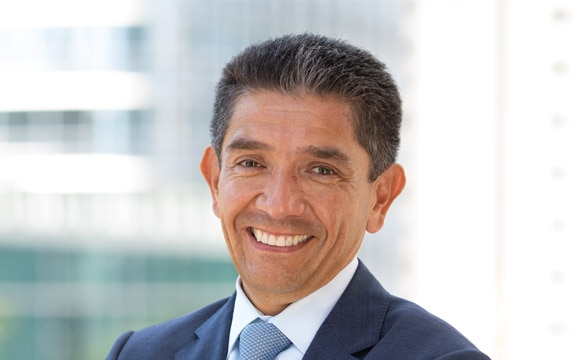Hello. I’m Omar Aguilar, Chief Investment Officer of Passive Equity and Multi-Asset Strategies.
I see four key themes affecting the global environment for the next 12 to 18 months, an equity market rotation, emerging markets growth, a focus on climate change, and global liquidity.
The theme I’ll talk about first is an equity market rotation. Almost every economic recession starts the healing process once you solve the source of the crisis. This time, the source is COVID-19, and we have not solved that yet, although there has been progress.
Once a vaccine or treatment that reduce fatalities become widely available, we think cyclical stocks will start to do very well. Technology will probably continue to drive the way of our lives, but the chances of a cyclical rotation mean investors will need exposure to all segments of the market, not just momentum-driven tech stocks. We think fundamentally-weighted index strategies offer a great way to invest for such a rotation, which should help the small-caps and value stocks, as well. I also think we’ll see an eventual rotation into international stocks, although the timing will be highly dependent of the evolution of the pandemic in different regions of the world.
Emerging markets are not the same as they were 10 or 15 years ago. And this brings me to my second theme.
In past global crisis, emerging markets often crash, but that didn’t happen in 2020. In fact, China was the only major economy with positive GDP growth for the year. China controlled the virus better than most countries, and the demand for goods and services by China continue to drive overall emerging markets growth.
So we think emerging market demographics will help drive global consumption in 2021. And with low interest rates around the world and a likely weaker US dollar and stable commodity prices, money should flow towards the potential growth and yield emerging markets offer. We think one of the best approaches to invest in emerging markets is to use a combination of cap-weighted and fundamental index strategies.
Climate change is a natural theme. Droughts, wildfires, hurricanes, and other challenges are on people’s minds.
Social and environmental concerns seem to be increasingly important. So we think select investors are likely to be highly critical of companies that don’t seem to care about the environment. I think that giving people opportunities to reflect their values and to act on the way they think about climate change will be an important driver of investments in the future. Thanks to technological innovation, direct indexing is emerging as a means for investors to express those preferences. Direct indexing pairs well with investors who are interested in building a personalized experience and want to express their ESG preferences in an indexing strategy.
Finally, liquidity is likely to be with us for a long time. The global economic crisis is going to leave a lot of scars. Even after a vaccine becomes widely available, it’s going to take time for employment to heal and for the service sector to fully recover, and to have people readily eating at restaurants, flying on planes, and so on.
Economic growth will be slow, so central banks will likely keep interest rates very, very low for some time. This is to support the credit market and to lower the volatility of risky assets. Low interest rates could drive low asset class returns and will be a limited factor in certain sectors, like financials. Low interest rates will also likely be a challenge for retirees, especially those that require income-producing assets.
In closing, with interest rates historically low, investors should be aware of the risks that come with higher-yielding securities. Investors should also think about diversifying in preparation for an equity market rotation. For investors who have neglected value, cyclicals, small-caps, and international stocks, volatility may be a good time to harvest tax losses and to reposition the portfolios for the future.
